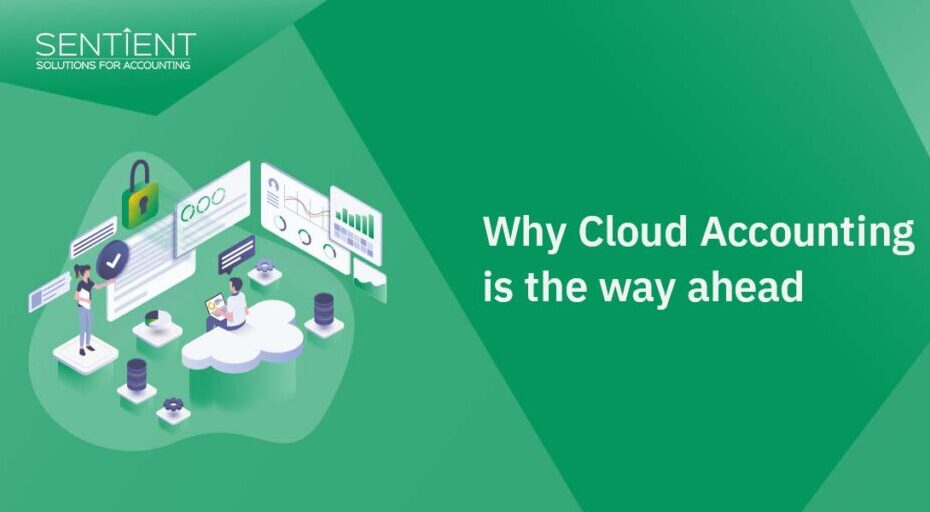With the ubiquitous presence of cloud computing, CPA firms have adopted the technology prolifically. According to Verified Market Reports, the Cloud Accounting Software market will reach an estimated valuation of US$ 4320 million by 2024.
Traditional accounting technologies, which are usually hosted on-premise, have often witnessed limitations and are now being replaced by custom cloud accounting that offers flexibility and better control to the users. In fact, by leveraging cloud technology, CPAs, Managers, and Partners will have access to data anywhere, anytime.
In addition, cloud-based accounting also offers robust security, constant data backup, and real-time collaboration through which businesses can automate bookkeeping, cash collection, and bank reconciliation, all of which drastically reduce tasks that are relatively lower value.
With cloud computing, accounts can get instant access to real-time reporting, financial intelligence, insights, and key data needed to make informed decisions. Transactions will be recorded on the go and can be exported into the relevant templates and shared digitally. Let’s understand more about the nitty-gritty of cloud-based accounting.
Benefits of Cloud Accounting
According to a study conducted by Xero, companies that use cloud-based accounting exclusively saw a 15% growth in the year-over-year revenue pattern and were also able to get 5x the total number of customers than the companies that don’t use cloud accounting exclusively. Additionally, the 2019 McAfee report 87% of companies have felt an acceleration in their businesses by incorporating cloud in their business processes. Following are some of the key benefits of cloud accounting systems:
1) Cost-effectiveness and Logistical Advantage
Setting up the on-premise infrastructure to support accounting activities incurs huge costs, not to mention the ever-growing hardware to support expansive storage and the computational demands as well the accompanying maintenance which can be daunting. Companies will also have to pay an experienced server and network administrator to keep the going smooth. According to a Forbes study, the cost of labor is reduced by 50%, and capital utilization is appreciated by 75% with the help of cloud accounting. An added benefit of cloud accounting is that enterprises can scale up or scale down the utility of resources and only pay for those that are used.
Mobility and instantaneous access to information is another key advantage of cloud computing. Working online reduces IT costs and saves time by keeping accountants constantly connected to the business. Instead of waiting to return to the office, accountants can work from any geographical location.
2) Improved Productivity
Cloud accounting’s ability to automate many routine tasks enhances CPAs’ productivity and enables them to pay attention to business-critical matters. Automating key processes helps keep track of all the data in real-time and helps minimize human errors while keeping financial data up-to-date and accurate.
Cloud accounting systems are also regularly updated with new features and improvements that happen in the background with little to no intervention from the user. With cloud-based accounting, data is always backed up and stored securely in the cloud. Even if the hardware gets damaged due to accidents, theft, or obsolescence, all the data is still accessible and secured through the system.
3) Centralisation of Data
Another key benefit of using cloud accounting software is the centralization of data and the facility to share all files. This eliminates the possibility of having different people working on the same file and allows for efficient file version management, user access, and permissions. Cloud accounting allows for real-time assistance and resolution of issues, as all parties involved can easily access the same file at the same time.
4) Scalability
With the ability to scale and adjust to meet the needs of a growing business, cloud accounting systems can meet the growing needs of businesses. The system can be designed to incorporate services and functionalities that are tailored to your business.
5) Integration with Thirty Party Applications
Having your accounting software work in tandem with a network of programs in your enterprise helps to create efficient ways of working. For instance, cloud accounting systems can be integrated with programs that create reports for sales pipeline, inventory system, and cash flow forecasting.
With the facility of open APIs, cloud accounting software allows you to add a variety of third-party apps and tools. These solutions help you streamline processes and increase efficiency.
Conclusion
Cloud accounting software is revolutionizing the way businesses operate and manage their financial information. It provides businesses with all the features and reliability of traditional accounting systems but with the added advantages of online technology.
Cloud accounting can remarkably improve efficiency and help employees to make the most of their time. Streamlining your accounting processes and driving efficiency is a great way to improve your bottom line.
At Sentient Solutions, we help accountants and CPA firms improve scale and reduce operating costs with process automation, AI, and scalable services.
Reach out to us today!
